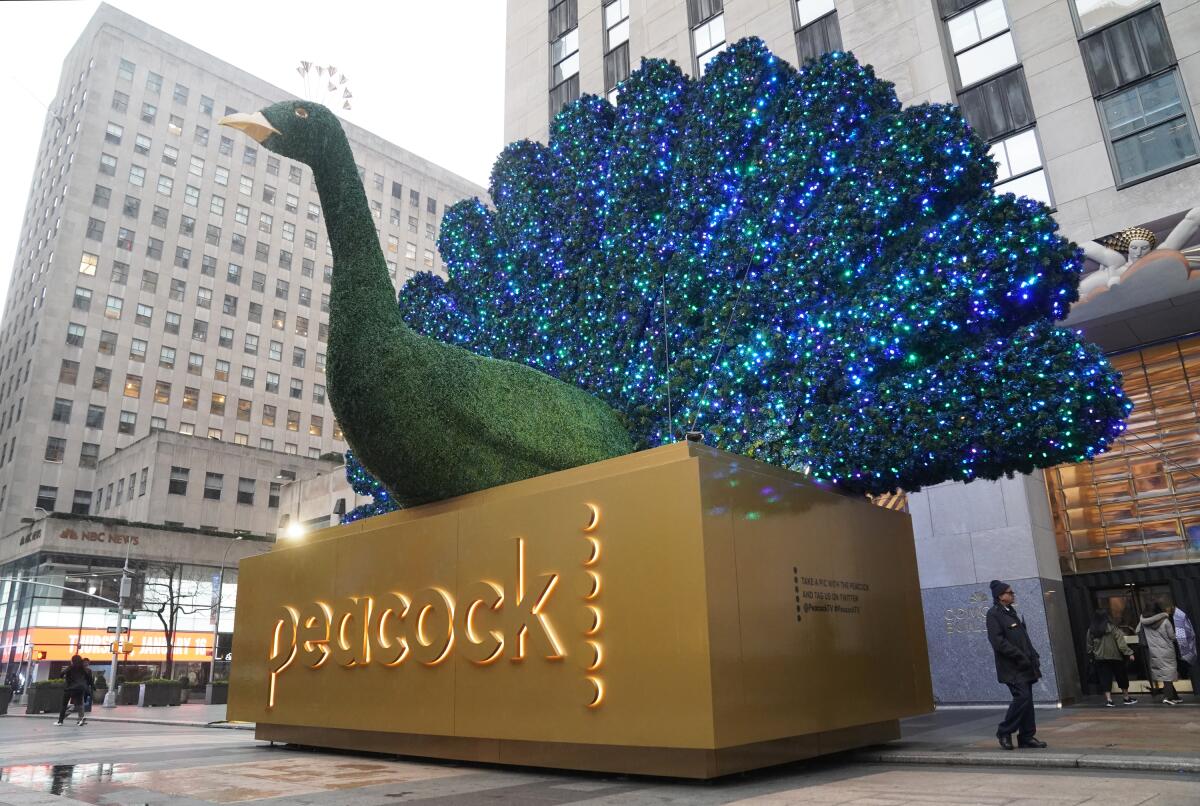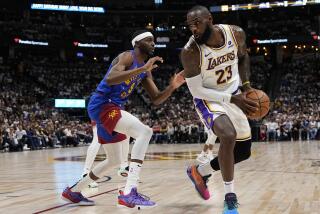NBCUniversal wades into streaming wars with Peacock

NBCUniversal’s Peacock streaming service debuts nationwide Wednesday, betting that weary consumers will tolerate a few commercials in exchange for a low-priced offering that includes news, sports and thousands of hours of TV shows.
The gambit sets the NBCUniversal’s service apart from streaming giants Netflix, Amazon Prime Video and Disney+. Those services have soared in popularity in recent years with edgy original shows, deep libraries of movies and TV classics — and a lack of commercial interruptions.
But NBCUniversal and its parent, cable giant Comcast Corp., have little interest in encouraging more consumers to cut the cable cord. Its goal is to preserve traditional TV economics by replicating the very features that keep tens of millions of consumers still watching network TV and paying their monthly cable bills.
“Peacock is the manifestation of the next version of broadcast TV,” Matt Strauss, chairman of Peacock, said Tuesday. “We think Peacock is the tip of the spear for the next incarnation of NBC.”
Just like the early days of TV, Peacock will be available free to millions of consumers, including 24 million homes at launch.
The New York media company’s service will come in three tiers : a free option with 13,000 hours of video-on-demand programming and 20 themed channels, including ones for NBC News, E! News and Jimmy Fallon’s “Fallon Tonight”; a $4.99 a month premium offering with channels and more than 20,000 hours of video-on-demand content; and a $9.99 a month commercial-free option.
While the premium service will have a handful of originals, it will draw on an expansive slate of shows produced for the company’s linear channels, including NBC, Bravo, USA, Syfy, E! and Telemundo.
Peacock launched in a limited run in mid-April when it became available to Comcast’s premium internet and pay-TV customers. The early preview gave executives insight into the features and programs most popular with consumers. The test run came in the early days of the COVID-19 pandemic when viewers binged on familiar “comfort food” shows.
But executives also discovered that more viewers than expected watched Peacock like they watch old-fashioned TV, by turning on a channel rather than searching for individual shows. So they opted to create more themed channels, to showcase NBCUniversal’s strengths.
“So many streaming services are static: There is no sense of time or place, they are kind of like a casino,” Strauss said. “But that’s not how TV works. TV is social; it taps into culture and programming changes.”
But as a late entrant into the streaming wars, Peacock faces plenty of hurdles.
For more than a year, NBCUniversal had planned the launch of Peacock to coincide with its comprehensive coverage of the 2020 Tokyo Olympics. But in late March, as the coronavirus outbreak struck, the International Olympic Committee and the Japanese government postponed the Tokyo Summer Games until next year.
Additionally, despite the network’s ubiquitous mascot, Peacock isn’t a household name.
Then there’s the matter of distribution. The company has been working to strike partnerships with distributors, including Cox Communications, so that its subscribers can get Peacock for free. The goal is to reach more than 35 million consumers within a couple of years, putting it on par with Hulu.
Peacock also will be available on Apple devices, Google platforms including Android TV and Chromecast, Microsoft’s Xbox One devices and Vizio and LG smart-TVs. Comcast’s eligible Xfinity X1 and Flex customers have access as well as eligible Cox Communication’s Contour customers, at no additional cost. Starting the week of July 20, Peacock also will be available on Sony PlayStation 4.
Nonetheless, NBCUniversal failed to strike partnerships with Roku and Amazon Prime Video, which could bring tens of millions of additional households into the mix.
Tal Chalozin, cofounder and chief technology officer of advertising technology firm Innovid, said not being available on popular platforms such as Roku could be a challenge for Peacock.
“Definitely, distribution is key,” Chalozin said. “But Peacock is the only one that’s launching with a free tier. More than anything, NBC comes in with a very strong brand, so I’m bullish on their ability to scale up numbers.”
NBCUniversal plans to spend $2 billion on Peacock in the next two years and reach profitability by 2024, executives said. It opened the door to advertisers who have been shut out of most streaming services that are built around subscriptions.
Advertising-based streaming has made a resurgence during the COVID-19 outbreak as consumers look for more budget-conscious viewing options. Rupert Murdoch’s Fox Corp. bought ad-based Tubi for $440 million in March. ViacomCBS Inc. is expanding its Pluto TV offering with additional shows.
NBCUniversal recognizes the value of that format, in part, because it was one of the founding partners of the streaming service Hulu more than a decade ago.
“This isn’t their first rodeo,” said Stephanie Dade, senior vice president of global content and operations for the Los Angeles-based BEN. “They’ve been a leader in the streaming space for quite awhile and they know how to program for wide audiences and very-niche lifestyle channels. And they have been incredibly supportive of their advertising partners.”
The multitiered pricing plan for Peacock could be an advantage because it makes it easier for households to sample the offering without sticker shock, said Needham & Co. media analyst Laura Martin.
Martin compared the plan to the “freemium” model that propelled music streaming service Spotify to popularity.
“The hybrid model is the smartest,” she said, “because you get people hooked on your content and then they pay to watch without ads.”
As consumers remain sheltered at home, Peacock’s free version could prove particularly popular, said marketing and advertising industry veteran Shini Reddy Wark, who is the chief revenue officer for Ryff, a product placement technology company.
“Especially with the economy having issues, people are going to become more selective,” she said. “They are not going to be able to hold on to that many subscriptions.”
Despite the challenges, NBCUniversal needs a streaming offering that gives customers the option to binge-watch shows online without undermining its pay-TV business.
“The consumer has spoken, and they want to binge watch,” Martin said.
More to Read
Inside the business of entertainment
The Wide Shot brings you news, analysis and insights on everything from streaming wars to production — and what it all means for the future.
You may occasionally receive promotional content from the Los Angeles Times.












